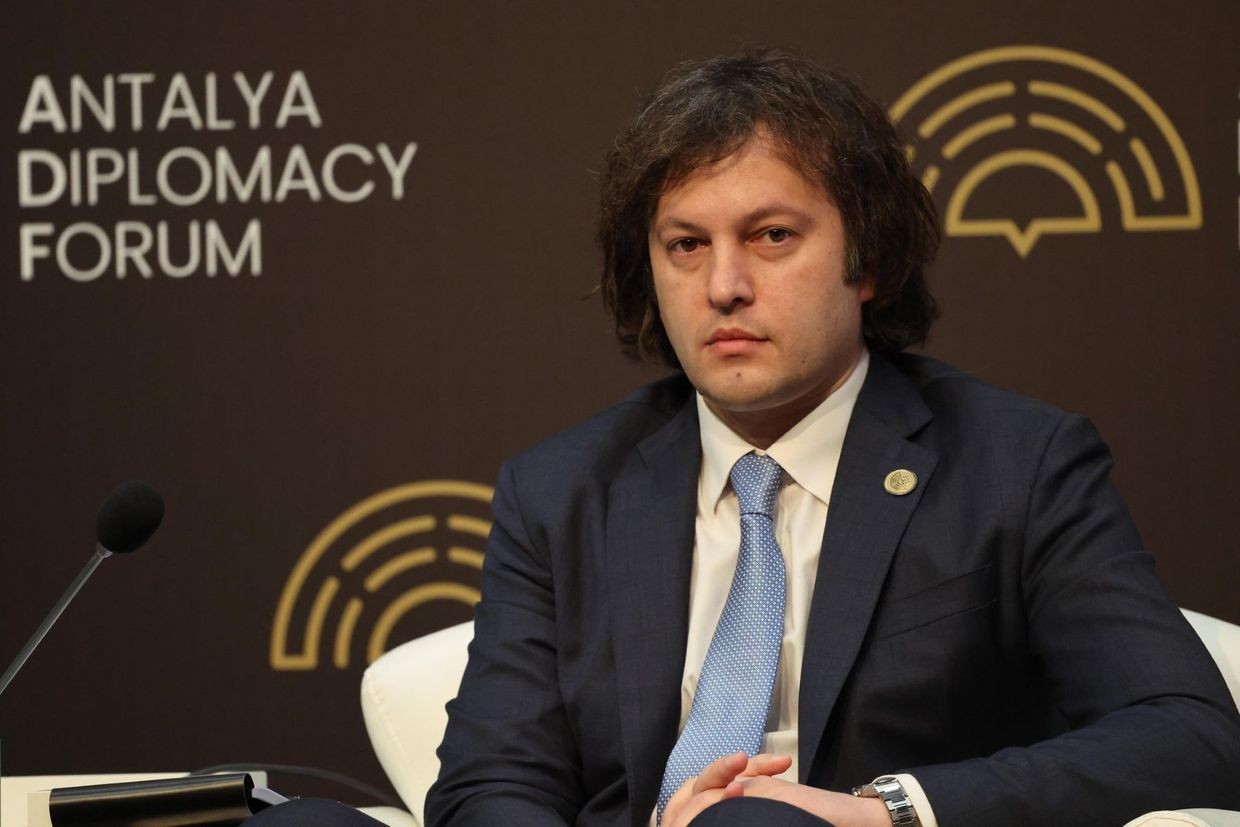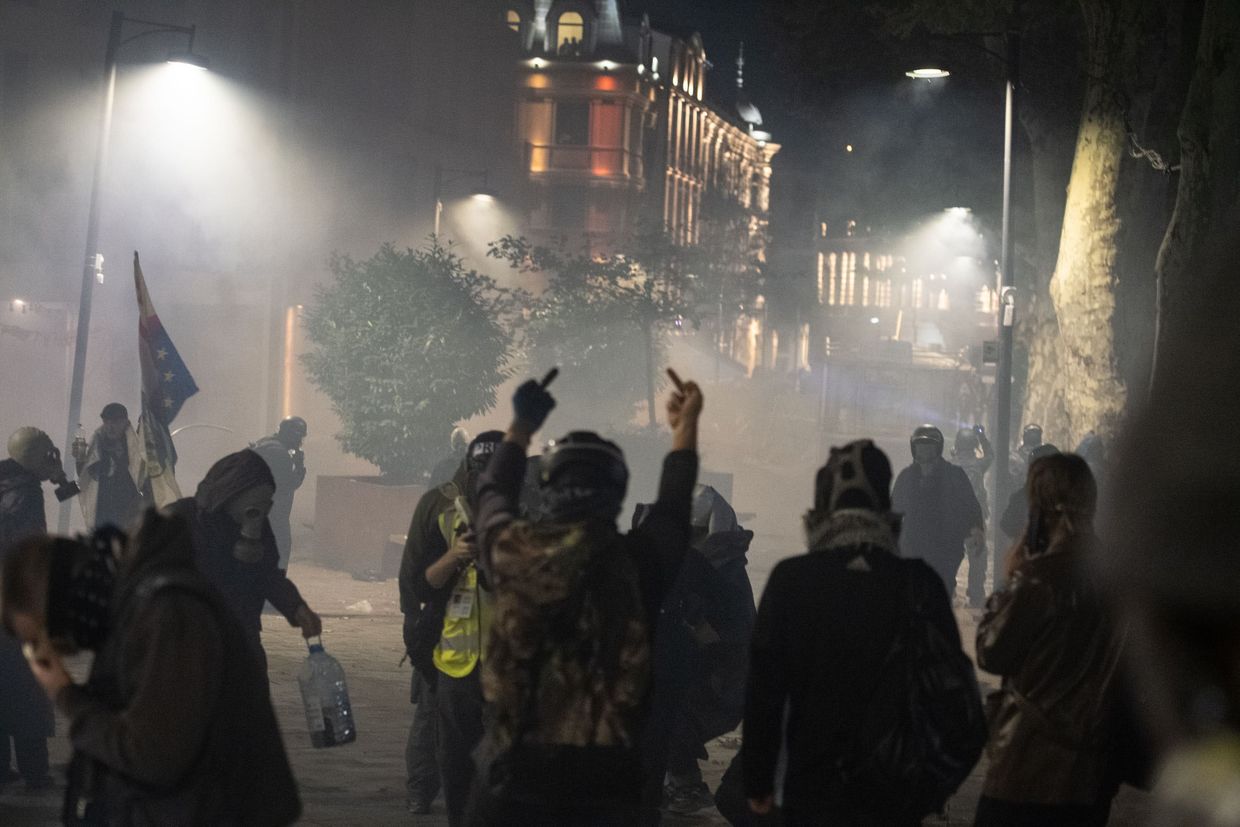
Days after an attempt to storm the Presidential Palace on the same day as local elections, Georgian Prime Minister Irakli Kobakhidze has downplayed the significance of the daily anti-government protests, threatening a policy of ‘zero sympathy’ against the protest movement, which he claimed is supported by ‘foreign intelligence services’.
Kobakhidze made the remarks on Monday night as a guest on the pro-government TV channel Rustavi 2’s programme Night Courier.
During the interview, Kobakhidze downplayed the significance of the protests, claiming that they are attended by ‘500 people in rotation’.
‘Most of them are seasoned agents. Some may know that a particular person is an agent, some may not, but none of them deserve sympathy, not even a little, because in reality they are acting — whether directly or indirectly’, Kobakhidze claimed.
‘When 100 people block a street: imagine, and they realise that 100 people are using violence against four million people. They realise it. If you realise that and still do it, how can you expect anyone to feel sympathy for you? Impossible — we have zero sympathy for these people.’
He additionally claimed that Georgia’s opposition groups ‘attempted five revolutions in four years’.
‘Everyone saw that they cannot overthrow the government. You lost 10 elections, you attempted five revolutions in four years and failed. You have no chance. And they see they have no chance. So why do they stay? Their single job is to somehow create a constant problem for the country’, he said.
In the same vein, Kobakhidze alleged that protesters receive orders from ‘foreign intelligence services’.
‘Also, as is obvious, they previously had American bureaucracy involved too, but thank God there are no longer attacks on Georgia coming from the United States, for which thanks are due to President [Donald] Trump’s administration.’
‘The main thing is that the struggle between the Trump administration and the deep state ends with the Trump administration’s victory’, he claimed, echoing conspiracy theories the ruling Georgian Dream party has been regurgitating since Russia’s full-scale invasion of Ukraine in 2022.
Kobakhidze additionally claimed that European ‘bureaucracy is involved in anti-state actions against our national interests’.
Georgian Dream regularly hits out against EU officials and diplomats, including ambassadors to Georgia.
On 16 September, Prime Minister Irakli Kobakhidze claimed that a ‘large part of [EU] ambassadors present themselves to Georgian society as ambassadors of hatred’, specifically singling out Dutch Ambassador Meline Arakelian, who had met with the now-detained opposition politician Elene Khoshtaria before she was arrested for writing ‘Russian Dream’ on a Georgian Dream election banner.
He promised ‘methodical systemic steps’ to prevent protester violence against ‘four million people’.
‘Of course we will act in accordance with the law, in accordance with the constitution, basic rights standards will be protected, everything will be safeguarded, but once again: zero sympathy for these people. I do not exclude that among those 150 people standing far away there are 10–15 genuinely sincere fools [...] but even towards them our sympathy will be zero, because foolishness is also punishable when you oppose national interests and have no moral justification’.
‘When you realise you lack the intellect to understand elementary things, that you are acting according to foreign orders in a scripted role, that too is a kind of crime’, he said.
He suggested that ‘gatherings’ could also be restricted, in reference to protests on Rustaveli Avenue, a hotbed of protests in central Tbilisi.
When asked whether the government would prevent protesters from blocking the avenue, Kobakhidze refrained from discussing details but said they would respond to the protests via a ‘methodical approach’.
During the interview, Kobakhidze said that the government has ‘much more resources today’ compared to what it had before the 4 October local elections and accompanying protest.
‘A corresponding special operation is still being carried out today, several criminals will be arrested today and this process will continue, of course’, he said.
On the same night, Georgia’s Interior Ministry announced that it had identified 15 people it sought to arrest in connection with the protest on 4 October — 13 of whom had already been detained.





![Baia Margishvili standing in central Tbilisi with a sign reading: ‘The Prosecutor’s Office [is] a punitive squad. How many more innocent people will you put in prison?’ Photo: Mariam Nikuradze/OC Media.](/_next/image/?url=https%3A%2F%2Fassets.bucket.fourthestate.app%2Foc-media-prod%2Fcontent%2Fimages%2F2026%2F02%2Fcalls-for-sanctions-and-raids-19-10-25-48.jpg&w=3840&q=50)




